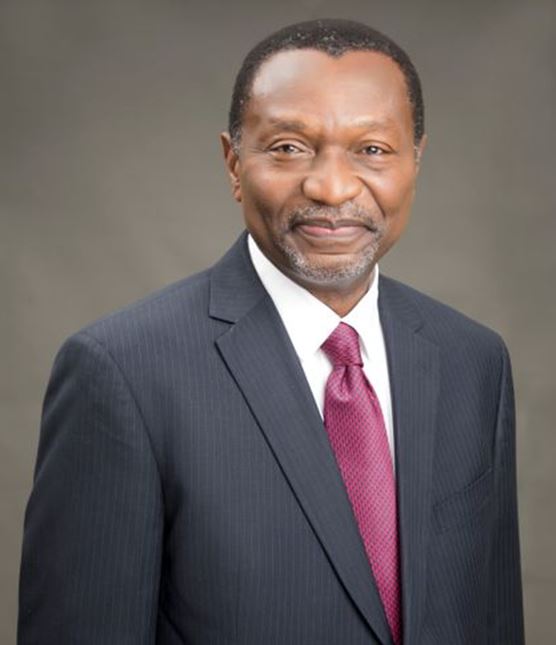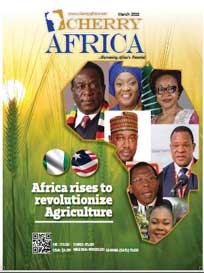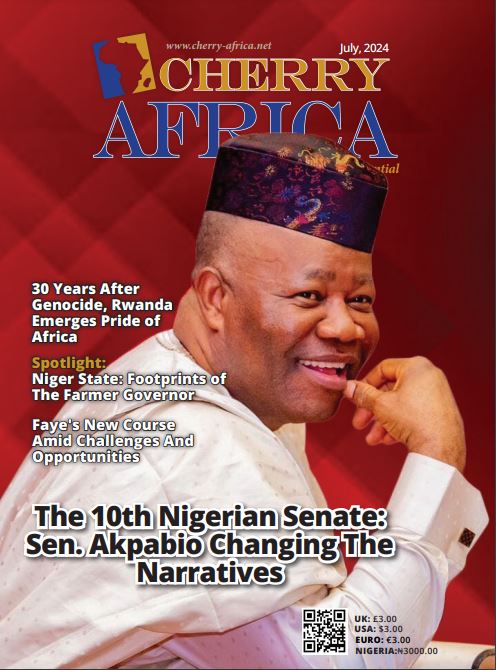1929 in Nigeria’s sociopolitical history is best remembered for the Women’s Riot over obnoxious taxation imposed by mercantilist and insatiable Colonial Masters of the day. Madam Adiaha Edem Udo Udoma, mother to late Justice Egbert Udo Udoma, was shot dead while seeking and demanding for equity. In this deep, explorative interview with Carolyn Isaac, the progeny and son of the great Udoma consanguinity, Senator Udoma Udo Udoma recommed conscious perpetuation of landmarks that defined his grandmother in contemporary discourse of the place of women in nation building and gender emancipation as the greatest tribute amongst other sundry issues.
Over time you have sustained the ideals and values of your father (late Justice Egbert Udo Udoma, the first African Black Chief Justice of Uganda). How is life after public service?
Until the end of one’s life, one is still always available for public service. Public service in our family is a lifetime commitment because we have different phases of it. The way I was brought up by my late father was that for any person, whatever you do in life, unless you also have served the public or done something for the public, your life is not complete. Though, he always believed you should make your money, make your income and your career in the private sector. Generate income not from the public sector but you should devote your time and service for the public sector that was how we were brought up.
Given the role of your grandmother during the 1929 Women Riot, what would you still recall?
Well, the riot was in 1929 and I was born in 1934. So, clearly, I do not have any recollection. However, while growing up, my father told the story of how our grandmother was someone who believed in justice and equity and who was an organizer, a successful trader. She was quite well off but in spite of that she always felt it was not enough to be comfortable. You must look out for others and you must stand up for what is right and so she led the women uprising as it were against unfair imposition of taxes and in the course of that she unfortunately lost her life and my father who was then about 12 years old had to be withdrawn from school to identify his mother’s corpse, you can imagine how traumatic that must have been for a child of that age whose mother said goodbye when he left for school with a promise of returning after the meeting with the district officer only to find his mother in the midst of other corpses.
That was quite agonizing for his age, the sight of his mother’s corpse must have laid the foundation that later shaped him for the future?
Sure, that sight left an indelible mark on him and it was part of the inspiration that led him when he came back from studies after he became a lawyer. He committed himself to public service, to his people and was very active in the Ibibio Union for a very long time and he also went into politics fighting for the right of the people and so he wanted the Calabar / Ogoja state to be created to protect the minority of the East. So that was what he stood for and it was that sense of public service that made him accept to serve in the judiciary. It was a major reduction in his income to accept judicial service which he had refused for quite sometimes but in the end, he felt that this was another way he could serve the public and so he accepted to be Judge and he accepted also to be the first African Chief Justice of Uganda. It was that commitment to public service that he had.
As one of the living sources of the massacre, can you help authenticate where the event really occurred and figures in view of what appears to be contending opinions?
Well, I know there was women riot in Aba and there was women riot in the then Opobo, what I can’t tell is whether the one in Aba registered as much fatalities as was recorded in Opobo, Ikot Abasi where my grandmother was killed, but both places had women rioting unfair taxes imposed on the women by the then Colonial Masters.
In your days as a Senator, what efforts did you make towards getting the British government to honor the victims of 1929 Women Riot of which your grandmother was one given your relationship?
As a family, we don’t like advertising our own achievements. We believe that is for others to do and we don’t believe in self-glorification which is why you never saw my late father going on to advertise what his mother did but others. My father believed that you should commit yourself to public service and that when you do that it is for others to assess the impact of what you have done not for you to indulge in self-glorification. So, you will never see our family promoting ourselves, all the attention that was given was the work of others who saw the good in our family and others promoted it.
Should Nigeria demand reparation from the British government for the killing of unarmed innocent women during the uprising, would you be willing to lend your voice?
Well, I don’t look at things that way. We should move on. We have our freedom now. Let us enjoy it and use it wisely. Let us recognize the people who helped to get us where we are today. Let us recognize the sacrifices of people like my grandmother and other women who lost their lives in that 1929 women riot in Ikot Abasi and later on of the various people who fought to get us here and, in that recognition, we should cherish Nigeria and make it work well as we grow. That, to me would be the best tribute to all those people who fought to get us independence. The greatest tribute will be how well we manage the Nigeria of today and our contributions to Nigeria.
Can you proudly say we still have women of your late grandmother’s vision and bravery in Nigeria today?
Well, I think it is for you to assess. What I would say is that her story is a good example for people and indeed African women to emulate and that each of us in our own way can do things to contribute to public growth of Nigeria.
Let’s digress a little, you had one of the biggest law firms in Nigeria and like your father, you were very successful in your law practice when you contested elections for a senatorial seat. What was the attraction in politics to become a Senator?
Yes, I had and still have a very successful law firm in Nigeria, very successful. I decided to take time off from that practice to run for the senate as a means of making a contribution and part of what drove me was that the battle my father and grandmother fought was still not won because under the Nigeria we found ourselves, those of us from that part were not given full recognition in terms of the revenues that came from there. We were not given enough derivation due us so this was a continuation of the fight because it never finishes. For my grandmother’s generation, it was fight against unfair imposition of taxes by the colonial masters. In my father’s generation, it was a fight for independence as well as ensuring that states were created in Nigeria so that each group is as near as possible and should have an area in which they are not marginalized. So, they fought for Calabar/Ogoja states and in the end, they got it. So, what is today known as Akwa Ibom State, Cross River State, Rivers State and Bayelsa State all came from the Calabar / Ogoja movement which my father championed. Ultimately, his dreams came through for my father. In my time, those states having been created we now found out that revenue that were being generated, we were not getting our fair share and that became my battle and I took that battle up which was why I ran for the senate. I took that battle up for onshore/off shore dichotomy to be removed and so that was my battle and we fought it together with others because generally you cannot win a battle by yourself. Together with others we fought the battle both those from Akwa Ibom and other parts of the country in the National Assembly as well as the then Governor of the State, Arch. Obong Victor Atta. We drafted a bill, got sponsors and then persuaded the then President Olusegun Obasanjo’s government to also send a similar bill and we merged the two bills and succeeded in getting it through the National Assembly which is why Akwa Ibom State moved from getting one of the least derivations to getting one of the highest derivation. So, the resources that Akwa Ibom State is enjoying today were things that I contributed to fighting for. Every generation has its battle but the inspiration came from a tradition my grandmother fought for the public good and lost her life in that process.
That was quite remarkable in the history of your people, aside that, what would you consider your greatest achievements in public service?
I think it’s not for me to judge or asses my achievements, it’s for people to asses it. But I can say while in the senate, the onshore/offshore dichotomy cut was one of my achievements but I also contributed to a lot of things. I led the federal government delegation of the National Assembly that went round various creditor countries to try and get debt relief for Nigeria. I led that working together with the Executive which at that time was Dr. Ngozi Okonjo-Iweala. So, we worked together. I was of the National Assembly, she in the Executive and we were reporting to the President on a daily basis. He must be given a lot of credit because it was his drive as a President but all of us contributed. Dr. Ngozi Okonjo-Iwuala the then Nigerian Minister of Finance and I as the Chief Whip of the senate and the leader of the National Assembly delegation that went on a tour trying to persuade the various creditor countries to give us debt relief. So, I was involved in achieving that for Nigeria in my time at the senate.
As the immediate past Minister of Budget and National Planning, What would you consider your most significant accomplishment?
A lot but very importantly, I helped to design and develop the economic recovery and growth plan. It was the economic recovery and growth plan that we used to get us out of recession. You know in 2016 we went into recession. As the Minister of Budget and Planning, I was responsible for that Plan and we had extensive consultations with the National Assembly, with our development partners, with various state governments, with unions and with the private sector extensively, which I led, and at the end of it developed the Economic Recovery and Growth plan. It was that Economic Recovery and Growth plan that helped get Nigeria out of recession which unfortunately we are back in due to COVID 19. At that time, it was a major achievement and very significant indeed cause up till now the government is still using it.
Nigeria is back in recession as you rightly noted. What would you advise as the way out?
I think what we did years back that took us out of recession, some of those things can still be done today. Luckily, the current Minister of Finance Zainab Ahmed, she was my Minister of State, we worked together on it so I’m sure we should be able to draw on it in trying to get us out of this recession and the governor of Central Bank of Nigeria, Godwin Emefiele was still the governor in my time so I’m sure they have enough to draw from there to help get the country out of recession.
It’s been six decades of existence as a nation, how would you rate Nigeria given its challenges?
Sixty years is a short time for a country. In the life of a human being is a long time but for a country, it is a short time. When you look at countries like the USA, you see the challenges they also went through. I believe that we will overcome these challenges. There are things that we could have done better, no doubt about that, but I believe that even in our mistakes of which we have done many, some which led to a civil war and some which led to military take over and many others, I believe that Nigerians will learn many lessons from those mistakes and we will be able to build on them and when new problems arise, we can look back and say yes, we went through this before, how did we resolve it. So, I am optimistic about the future. I appreciate and I realize that we could have done much better than where we are. Nevertheless, I believe that because of enterprising spirits because we have so many enterprising people in this country, we have so many dynamic people in this country and I believe that that dynamism, sooner or later will be mobilized to make Nigeria a great country.















